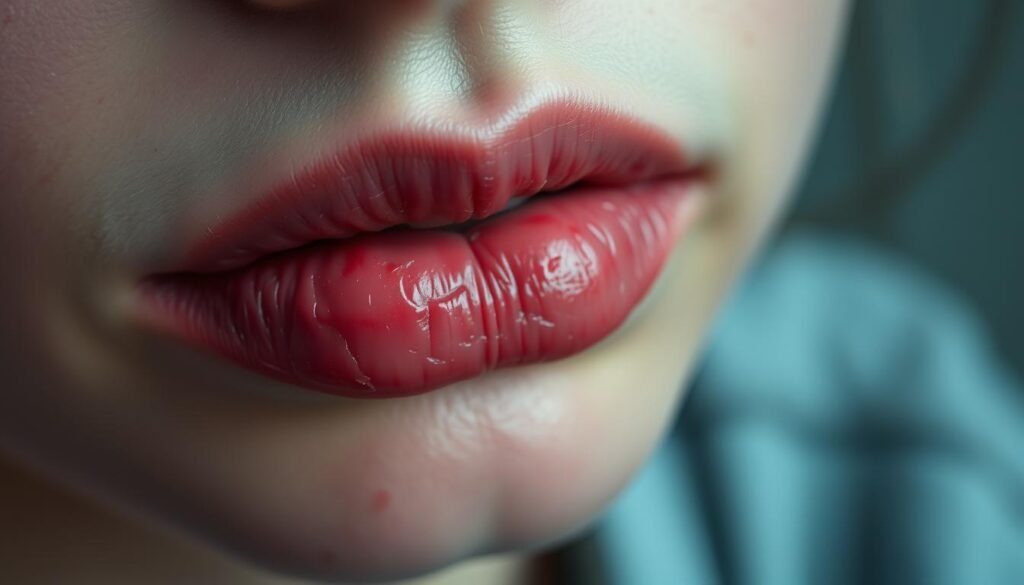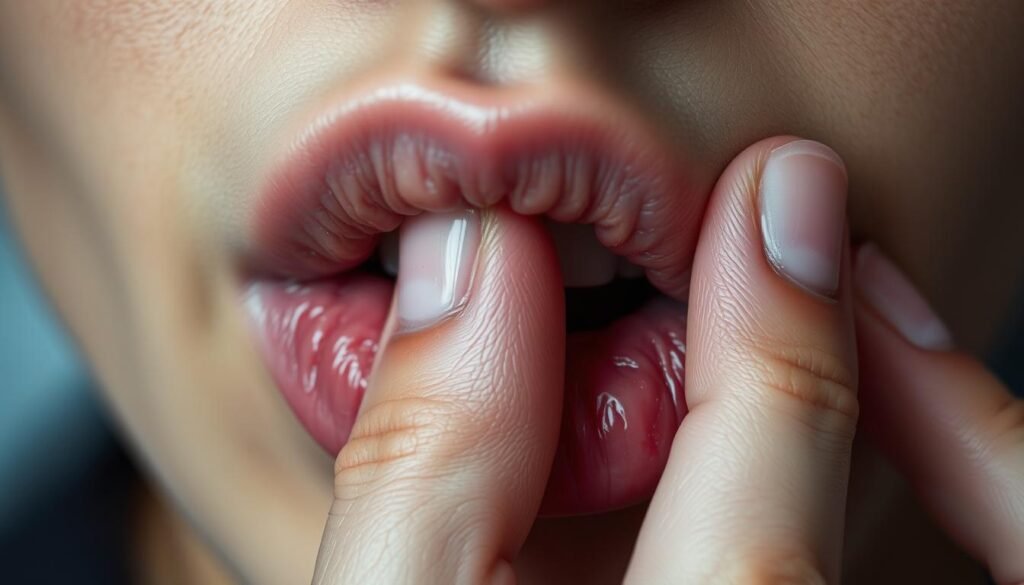Did you know that about 20% of people might practice body-focused repetitive behaviors (BFRBs) like lip biting? This habit often reflects their response to emotions such as stress, fear, or anxiety. Although it may look minor, the effects of lip biting anxiety are profound. It can harm one’s feelings and lead to sore, swollen lips. It’s crucial for anyone wanting to stop this cycle to understand its root causes and foster better habits.
Key Takeaways
- Lip biting is a common nervous habit linked to anxiety and emotional stress.
- Physical triggers include dental issues like malocclusion and temporomandibular disorder (TMD).
- Strategies such as cognitive behavioral therapy and habit reversal training are effective treatments.
- Awareness of genetic predispositions can help identify potential risks for developing BFRBs.
- Complications from chronic lip biting may lead to painful sores, swelling, and lip redness.
Understanding Lip Biting as a Nervous Habit
Lip biting often starts during moments of stress or worry. It’s a common nervous habit among people. It usually happens as a way to handle too much emotion or stress. This habit often begins in the teen years, especially from 11 to 15 years old.
Many turn to lip biting to deal with their feelings, often without realizing it. Studies show women are more likely to do this than men. About 3 percent of the population might have this issue, but many don’t know they do.
Dental problems like misaligned teeth or TMJ disorder can make lip biting more likely. Those conditions cause discomfort, leading some to bite their lips without thinking. This can hurt the lips and make them prone to sores and infections.
It’s important to be aware of why you’re biting your lips. This habit may seem helpful at first, but it can lead to problems, like painful sores and more stress. Knowing what triggers this habit is key to stopping it.
Physical Causes of Lip Biting
Lip biting can stem from various physical issues. Understanding these issues is key to effectively tackling the problem. Dental problems, especially misaligned teeth, play a big role. Misaligned teeth not only make it easy to bite your lips by mistake but can also cause other issues like TMJ disorder.
Dental Issues: Malocclusion and Temporomandibular Disorder
Malocclusion, or a bad bite, makes it likely you’ll accidentally bite your lips, cheeks, or tongue. This happens while you’re eating or talking. For those with this issue, unintentional lip biting is common. TMJ disorder affects the jaw joint too, causing pain and making lip biting worse. This jaw pain can make someone bite their lips more, trying to deal with the discomfort.
Other Physical Triggers
Braces or dental devices can also make you bite your lips. They make your mouth uncomfortable. Stress can make this irritation feel even worse, leading to more biting. Seeing a dentist is important for dealing with these dental issues. They can help offer the right treatment.
| Condition | Description | Possible Solutions |
|---|---|---|
| Malocclusion | Misalignment of teeth leading to accidental biting. | Orthodontic evaluation and treatment. |
| TMJ Disorder | Affects jaw function, causing discomfort. | Physical therapy and dental appliances. |
| Braces & Dental Devices | Irritation from orthodontic treatment. | Consultation with an orthodontist for adjustments. |
| Chronic Stress | Heightened sensitivity leading to nervous habits. | Relaxation techniques and stress management. |
Psychological Causes of Lip Biting Anxiety
Lip biting anxiety stems from deep psychological reasons. It is often a coping method for stress or worry. Such actions can harm both physical and emotional health.
Body-Focused Repetitive Behaviors (BFRBs)
About 1 in 20 people show body-focused repetitive behaviors, like lip biting. These habits can damage one’s physical health. They are more common in women than in men. Lip biting can start at any age as a way to ease stress.
The Impact of Stress and Anxiety
Stress and anxiety play a big role in why people bite their lips. It’s a response to feeling emotionally overwhelmed. Those with anxiety may turn to habits such as lip biting. Techniques like yoga or meditation may help reduce these behaviors.

| Behavior | Prevalence | Associated Conditions |
|---|---|---|
| Nail Biting | 30% | General Anxiety |
| Lie Biting | Common | BFRB |
| Dermatillomania (Skin Picking) | N/A | Obsessive-Compulsive Disorder (OCD) |
| Trichotillomania (Hair Pulling) | N/A | Commonly starts between ages 10-13 |
Keeping track of when you bite your lip and what triggers it can help. When it gets too much, it’s wise to seek a mental health expert’s advice. Facing the psychological roots and learning new coping ways can aid in beating lip biting anxiety.
Identifying Symptoms of Chronic Lip Biting
Chronic lip biting can lead to various symptoms. Often, these go unnoticed until the damage becomes severe. Recognizing these symptoms early can prevent further complications. This can significantly improve oral health.
Painful Sores and Lip Redness
The most common symptoms are painful sores and redness around the lips. Chronic biting causes inflammation, leading to discomfort and irritation. These issues can affect eating and speaking.
They might even lead to severe infections if ignored. Paying attention to these symptoms is vital. It helps individuals seek care in time.
Complications of Persistent Lip Biting
Persistent lip biting can lead to serious issues beyond irritation. Broken skin barriers might get infected. This can result in significant discomfort and even scars or chronic sores.
Anyone with chronic lip biting should see a doctor. Complications can affect health and life quality. Understanding psychological factors like stress helps in tackling the issue.
Behavior therapy can change lip biting habits. Support from friends or family is also useful. It helps in recognizing and stopping chronic lip biting.

| Symptom | Description | Potential Complications |
|---|---|---|
| Painful Sores | Open wounds from regular biting, leading to discomfort. | Infection and prolonged healing time. |
| Lip Redness | Inflammation around the lips due to irritation. | Chronic inflammation and skin damage. |
| Oral Infection | Possible bacterial infection from broken skin. | Further health complications, abscess formation. |
If symptoms arise, taking action is crucial to prevent worse problems. Deep breathing and mindfulness can help manage triggers of chronic lip biting. For more on anxiety management, visit this resource.
Lip Biting Anxiety: Understanding Compulsive Behavior
Lip biting often goes beyond just a nervous habit. When stressed, people can start doing it without thinking. Many don’t notice until they’ve already hurt their lips. It’s a way to deal with emotional pain, offering a brief break from stress.
Looking into why people repeat certain behaviors shows its link to anxiety control. Fighting inner issues, actions like lip biting offer comfort. Yet, they can make the stress worse, trapping people in a tough cycle. It shows lip biting is not just a habit, but a sign of deeper mental struggles.
Many deal with compulsive behaviors, like trichotillomania and excoriation disorder. With 3.7 million people in the U.S. suffering from trichotillomania, these aren’t rare. They are major issues affecting lots of people.
Helping those with these habits is key. Since there are no exact drugs for Body-Focused Repetitive Behaviors, other treatments matter a lot. Things like therapy and community support are important for healing. 
| Behavior | Prevalence | Common Treatments | Emotional Impact |
|---|---|---|---|
| Trichotillomania | 1-3% of individuals | Behavioral therapy, SSRIs | Shame, anxiety |
| Excoriation Disorder | 1.5% of individuals | Behavioral therapy, Clomipramine | Frustration, embarrassment |
| General BFRB | Common across genders | Support groups, therapy | Emotional distress |
Treatment Options for Lip Biting
Treating lip biting usually involves different methods. These include behavioral therapies and sometimes medication. With the right strategies, people can overcome the harm this habit causes, both emotionally and physically.
Cognitive Behavioral Therapy (CBT)
Cognitive Behavioral Therapy is a key method for dealing with repetitive behaviors like lip biting. It focuses on finding out what triggers lip biting and changing those reactions. Research shows CBT works better than drugs alone for these issues. It often uses mindfulness to help people notice the present moment and stop the urge to bite their lips.
Habit Reversal Training (HRT)
Habit Reversal Training is also a major part of treatment. HRT helps people notice when they’re about to bite their lips and do something else instead. It’s all about building new habits through regular practice. This method is especially good for handling specific triggers that lead to lip biting.
Behavioral Approaches and Medication
Changing behavior is a suggested way to fight lip biting. This can include relaxing more and using safe treatments on your lips to prevent biting. Although there are no specific drugs approved for these behaviors, some medications might help with the anxiety that comes with lip biting. For example, SSRIs and N-acetylcysteine show potential. If cost is a worry, the Optum Perks free Discount Card can help save money on these medications.
| Treatment Option | Description | Effectiveness |
|---|---|---|
| Cognitive Behavioral Therapy (CBT) | Helps identify triggers and reshape responses. | More effective than medication alone. |
| Habit Reversal Training (HRT) | Teaches alternative behaviors to override the urge. | Particularly effective for compulsive habits. |
| Behavioral Modification | Involves relaxation techniques and non-toxic topical treatments. | Supports the reduction of lip biting behaviors. |
| Medication | Off-label use of SSRIs and supplements like N-acetylcysteine. | May complement behavioral therapies. |
Alternative Techniques for Stress Relief
Managing lip biting anxiety requires a mix of relaxation and being mindful. By using stress relief methods, people can lessen the urge to bite their lips. This also helps control emotions better. Techniques for relaxing and being mindful can really help stop the cycle of this habit.
Relaxation Techniques
Relaxation methods are key in dealing with anxiety linked to biting lips. Some effective ways are:
- Deep Breathing: Slow, steady breaths can help calm the stress in the body.
- Progressive Muscle Relaxation: By tightening and then relaxing muscles, you can feel more at ease.
- Visualization: Thinking of a calm place can shift your mind away from biting.
Mindfulness and Meditation
Adding mindfulness and meditation into daily life offers a strong way to handle stress. Mindfulness keeps you focused on the now. This is key to understand and lessen the reasons behind lip biting. Meditation can include:
- Mindful Breathing: Paying attention to breathing brings calm and clear thinking.
- Body Scan: Concentrating on each part of the body helps relax and lower stress.
- Guided Meditation: Following along with recorded sessions can guide you through anxious thoughts to peace.
Using these techniques for stress relief might help those with lip biting anxiety. They can gain more control over their actions. Exploring ways to relax and be mindful can deeply affect emotional well-being.
Preventing Lip Biting Anxiety
Stopping lip biting anxiety starts with picking healthy life choices and building awareness. Good prevention tips can lower the urge to bite your lips. Working on a balanced life boosts emotional strength and overall health.
Healthy Lifestyle Choices
A healthy life is key to mental and emotional steadiness. Doing regular exercise, eating right, and getting enough sleep help control anxiety. People who focus on these areas often manage emotions better and don’t bite their lips as much. Here are some important lifestyle tips:
| Healthy Choices | Benefits |
|---|---|
| Regular Exercise | Reduces anxiety and improves mood |
| Balanced Nutrition | Supports brain function and emotional health |
| Sufficient Sleep | Enhances emotional resilience and decision-making |
| Mindfulness Practices | Increases self-awareness and emotional regulation |
Awareness and Journaling
Growing awareness is vital for fighting lip biting anxiety. Journaling helps spot emotional patterns and habits’ triggers. It boosts mindfulness and helps spot signs of anxiety early. Keeping a diary helps understand your impulses and make prevention plans.
Adding these techniques to your daily life helps control lip biting. It leads to a more mindful way of handling anxiety.
Conclusion
Lip biting anxiety can deeply affect how we feel inside. It’s important to know why we do it and how to stop. When we understand what causes this habit, we can find better ways to deal with it. This helps us avoid hurting ourselves and feeling stressed.
Finding the right tools to stop lip biting is key. Keeping track of when and why it happens can be a big help. Making good choices for our health helps us feel better. Sometimes, talking to dental health experts is a good step too.
Getting rid of this habit takes time and patience. Knowing what’s going on inside us and getting the right help are important. With effort and support, we can feel happier and stop biting our lips for good.